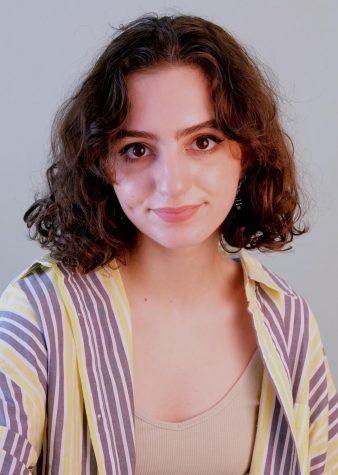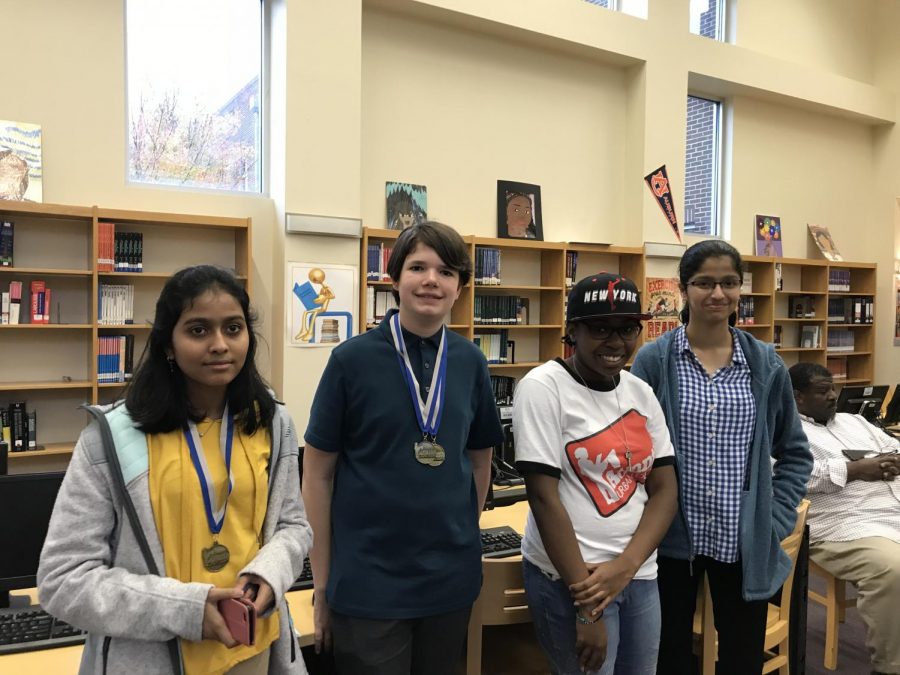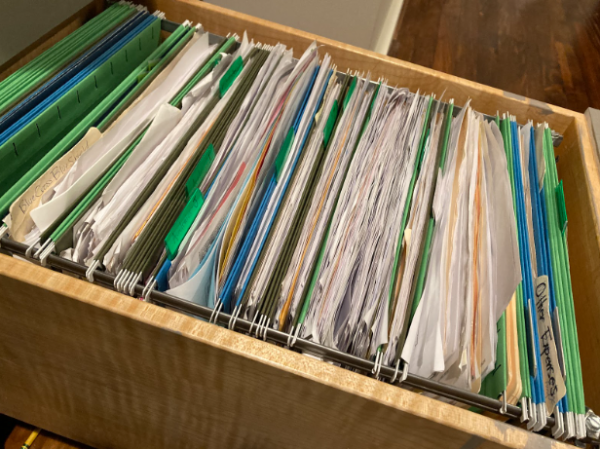Policy Reform Leads to Policy Debate at Chamblee
Photo courtesy of Keegan Brooks.
Chamblee debaters pose with a tournament judge after their December 1 competition. From left to right: freshman Tanzalia Jamal, freshmen Keegan Brooks, Deanna Sharp and Nikita Kunte.
After several years of absence, policy debate is finally making a long-awaited return to Chamblee. Composed mainly of freshmen, Chamblee’s Debate Team is now up and thriving with the help of juniors and student leaders Victoria Ordonez and Shrika Madivanan, as well as teacher sponsor Laura Lennard.
“This year we have policy debate every Thursday in Ms. Lennard’s room, and we also have a coach,” said Ordonez. “He debated at Emory, and he has a lot of contacts throughout the whole debate organization in Georgia.”
It is also thanks to this year’s freshmen debaters that the Chamblee Debate Team now has a coach. Coach Russell Brooks, father of freshman debater Keegan Brooks, is guiding students throughout the policy debate competition process. This year, he has introduced several changes to the Debate Team, one of which is the team’s recent involvement with the Atlanta Urban Debate League.
“The Atlanta Urban Debate League does a really good job of making [tournaments] accessible. The tournaments are all around Atlanta, and they all happen on Saturday between 8:30 [am] and 4 pm,” said Russell Brooks. “The Atlanta Debate League will then take some of the top debaters, and they travel and debate against people from other Urban Debate Leagues around the country. There’s even a national championship for the Urban Debate Leagues that Atlanta has won a couple of years ago.”
Madivanan, Ordonez, and Russell Brooks have also made the transition from parliamentary to policy debate this year. In the 2017-18 school year, the policy debate program fell through at Chamblee due to a lack of interest, so Madivanan and Ordonez introduced parliamentary debate that year instead.
“Parliamentary [debate] is less structured… It’s not anything like policy debate,” said Madivanan. “Parliamentary is like a different topic each week… for our parliamentary [last year] you could compete but there were less competitions for that. It used to be every week in our classroom for different topics that people were interested in.”
Meanwhile, policy debate follows one topic throughout the whole year. In contrast to the parliamentary competitions, policy tournaments are more regular and have a specific schedule.
“Policy debate is a structured form of debate, where two teams of two people debate one topic for the entire year about a policy in the United States federal government,” said Keegan Brooks. “This year’s debate topic is if the United States government should substantially reduce restrictions on legal immigration into the United States.”
At each tournament, students are assigned a negative or affirmative stance to debate. Prior to the tournaments, teams prepare to debate for both stances and work together to formulate convincing rebuttal arguments.
“There’s a specific case that they debate this year in the Atlanta Urban Debate League and that’s to open the borders to immigrants because that would help strengthen the economy,” said Russell Brooks. “On the negative side, they might present some arguments about how that might affect the wages of workers in the US… You get a chance to look at [the topic] from both sides and get really familiar with the issue.”
However, policy tournaments don’t involve the arguing that is typically associated with debate.
“People don’t think of debate as policy debate. They think of it as, ‘Oh, we’re arguing,’” said Madivanan. “That’s a big misconception. Parliamentary debate is more of that.”
At policy tournaments, there is more of a focus on presenting information in a persuasive way than on using effective research to formulate an argument.
“We’re in the novice division, so we get all the research and evidence that we have in the form of a packet,” said freshman debater Nikita Kunte. “We can’t use any other evidence outside of it, so it’s more important the way you present the information than what information you give them.”
And it appears that Chamblee’s Debate Team has been effectively presenting their information, as illustrated by the team award that they received on December 1, the date of their first tournament. Keegan Brooks additionally won an individual speaker award.
“We’re continually preparing and looking to go to different debate tournaments,” said Keegan Brooks. “As we go to each debate tournament, we’ll get better each time.”
The final goal for Chamblee’s debaters is the national competition in April, as mentioned by Russell Brooks. Their next tournament will be on January 12. During the same month, a bake sale will also be hosted in Chamblee’s Bulldog Plaza to support the debaters’ future endeavors. For now, the team is constantly practicing speeches and cross-examinations during the Thursday meetings.
“[As a coach] I explain the structure of the debate to them and introduce the arguments, sort of walking them through and talking about how the arguments fit together and some strategies for winning,” said Russell Brooks. “[Starting out] has been about giving people the information they need to get out and [debate] for the first time. From that point, oftentimes people get hooked.”
Your donation will support the student journalists of Chamblee High School Blue & Gold. Your contribution will allow us to print editions of our work and cover our annual website hosting costs. Currently, we are working to fund a Halloween satire edition.

Iris Tsouris is a senior and editor-in-chief of the Blue & Gold. Outside of the paper, you can find her giving out haircuts, designing T-shirts, and sampling fruit at the Buford Highway Farmers Market. In five years, she hopes to be caring for a herd of cattle while making art in an obscure Swiss village. This is her third year on the staff.






